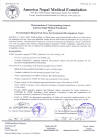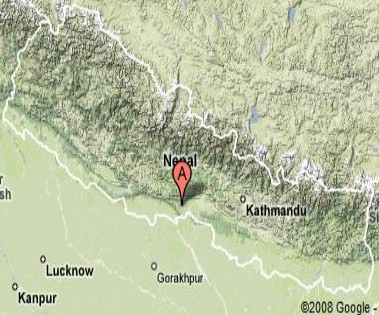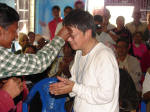Project Description
Project ID
07TU001
Project Type
Funded Project - Normal Project
Project Title
Project Summary
- To discourage the people from dependency on traditional healers.
- To well-train the farmers, students and traditional healers for first-aid to snake bite.
- To aware the people with venomous snake and safety from their bites.
Location
Time Frame
15-30 October 2007 or premonsoon period in 2008. For the effective implementation, premonsoon is good. However, because of late monsoon, snake bite is still hot cake in these area. So, we could do the same even in first to second week of October too.
Institution
Parasitological Research and Socio-Environmental
Development (PARASED)
Tribhuvan University
Contact
Deb Prasad Pandey
Institutional Member
Parasitological Research and
Socio-Environmental
Development, Nepal
Department of Zoology
Birendra Multiple Campus, Tribhuvan University
Bharatpur, Chitwan,
Nepal
Email: debpandey![]() gmail.com
gmail.com
Telephone: 00977-984-5055137 (Mobile)
Telephone: 00977-056-526215
ANMF/Nepal Project Manager
Dr. Shankar Rai
ShankarRai![]() anmf.net
anmf.net
ANMF/America Project Manager
Fred Shepardson
FredShepardson![]() anmf.net
anmf.net
Project Description
First Aid to Snakebite Training Programme
Snake-bite is significant public health problem in Terai belt of Nepal merely during April to November (Pandey 2005b). The peak snake-bite occurrence is evident in 15 June to 15 July (Ashad) in these areas (Pandey 2005b). In most developing countries up to 80% of the victims of snake-bite first consult traditional practioners before visiting medical center (Snow 1994). From the field based study in Chitwan and Nawalparasi it was known that 56% victims consulted or depended upon traditional healers, only 12% used some first-aid measure before arrival at hospital and the rest directly presented to a hospital for treatment. The majority of deaths (27% CFR) in this region could be due to dependency of majority of people on traditional healers who used traditional treatments such as tight tourniquets, local incision, suction, snake stone (Garud dhunga), herbal matters, vacuum extraction with the application of the anus of hens, thus delaying access to proper treatment center (Pandey 2005a). The most severely affected occupational group was farmers (59%) (Pandey 2005a).
Rationale of the training programme
It was needed because in Nepal most trained healthy workers who report on such injuries are urban based where snake-bite is rare, most rural sane-bite victims do not seek formal hospitalization but are treated by traditional healers. Hence, to improve the snake-bite treatment system and to reduce the mortality rate of snake-bite victims, the training programmes are the most essential in rural areas like Madi in Terai belt of Nepal.
The programme will be conducted in Madi (i.e. four Village Development Committee (VDCs) are included here) because it is the most rural area of Chitwan district. There, hitherto no electricity has been supplied. So, evening and night will be very risk of encounter with the snake due to invisibility. Also, there is no proper transport facility too. So, they faced many snake-bites but they could not access to the hospital in time for effective treatment. Hence, this first-aid training will pave the way to effective treatment at treatment center prior to dissemination of venom through out their body. Because of underprivileged region of the inner Terai, most of ignorant farmers will benefit from this training programme. Hence this training programme will have been considered essential in Madi, Chitwan.
Objectives
General Objective
To encourage the people to rush towards snake-bite treatment centre by adopting recommended first aid method.
Specific Objectives
- To discourage the people from dependency on traditional healers.
- To well-train the farmers, students and traditional healers for first-aid to snake bite.
- To aware the people with venomous snake and safety from their bites.
Methodology
The programme will be conducted in Madi Chitwan in between 15-30 October during which the farmers will be at rest after plantation. Also, this duration will be more epidemic to snake-bite health hazard. So, they will be ready for training readily.
For the training programme 3 well-read and write farmers from farmers group (Kishan Samuha) from each wards of the 4 VDCs, all the traditional healers from each wards will be included. The leading but simply literate farmers will be selected because he/she will learn more in training and also can provide good guidance to local people later on. If such literate farmers are not available in the area, illiterate but leading farmers from this region will be selected. The total of about 32 participants (27 farmers from each wards (9X3) + 5 traditional healer from one VDC) will be trained separately in buildings of particular VDC for 3 days. In this way four training programme for 12 days will be provided to this region consecutively in respective VDCs.
Meanwhile, all committee members (maybe 13) of Junior Red Cross Circle from higher secondary school (4) in this region will be summoned for training for next 3 days. This training programme will be performed at one of the central Higher Secondary Scholl (i.e. Madi Higher Secondaray School, madi). The trained students will disseminate the first-aid and safety measure to snake-bite among their friends circle in school and also in their localities. So, the training to students will also have been considered essential.
The training will be pictorial, visual, participatory and heuristic. The participants will be familiarized with the museum specimens of snakes which are kept in Museum of Kasara, Royal Chitwan National Park.
In 1st day, welcome programme and introduction to types
and identification of snakes will be done.
In 2nd day, theory class of first-aid, safety measures to
snakebite and practical class of first aid will be given.
In 3rd day, participants will demonstrate their skill of
first-aid treatment in their localities for which
participants will be divided into 9 groups for 9 wards in a
VDC. These groups are randomly allocated to any wards of the
particular VDCs. So, the demonstration will be effective and
interesting to locals. Also, such effort will broadcast the
need of first aid and other measures to safety from snake
bite.
For welcome function of five phased training programme about 10 guest (from school, VDC, health post, political leaders) will be invited. Hence, a total of 50 guests will be invited within 15 days programme.
Material Requested
None
Training Requested
None
Advisors/Instructors Requested
None
Travel/Expenses Requested
None
Grants/Stipends Requested
None
Other Items Requested
None
Total Funds Requested
$3,688
Budget
A. For Instruments and materials
- PowerPoint projector on hire for 12 days @ 500 per day = NRs. 6,000 US $93.20
- Overhead projector on hire for 12 days @ 300 per day = NRs. 3,600 US $55.90
- Generator - 1 on hire for 12 days @ 1000 per day = NRs. 12,000 US $186.50
- Transparency sheets (print) - 50 pics. @ 20 Rs. = NRs. 1,000 US $15.50
- Hands out - printing of about 100 pages (for diff. purposes) @ 10 Rs = Nrs.1,000 US $15.50
- Photocopy of - training materials - 50 pages @ 1 Rs/page for 180 trainee = NRs. 9,000 US US $139.80
- Files to 180 trainee @ 20 Rs./file = NRs. 1,800 US $27.90
- For other stationery (note book, pen, pencil, etc) – 180 trainee @ 40 Rs = NRs. 7,200 US $111.80
B. Venue charge
No charge is needed for programme venue or hall. Because, the meeting room of each VDC office for farmers and School meeting room for school students will be selected
C. Tea, coffee and biscuits
a. Tea
1st day – 180 participants + 50 guests + 2 trainers = 232 individuals @ 5 Rs./ cup of tea for two times a day = NRs. 2,320 US $36.10
2nd day – 182 individuals @ 5 Rs./ cup of tea twice = NRs. 1,820 US $28.28
3rd Day – 182 individuals @ 5 Rs./ cup of tea twice = NRs. 1,820 US $28.28b. Biscuits
182 trainee @ 20 Rs. Per individual for 3 days = NRs. 10,920 US $169.69
50 guest @ 10 Rs. Per individual = NRs. 500 US $7.80
D. Lunch
182 individual @ 100 Rs./ lunch for 3 days = NRs. 54,600 US $848.50
E. Incentive
To 180 trainee @ 150 Rs./day for 3 days = NRs. 81,000 US $1,258.80
F. Remuneration for trainer to cover travel and accommodation
2 trainer @ 1000 per day for 12 days = NRs. 24,000 US $372.90
G. Incentive to 2 helper who assist to carry projectors, generators etc.
1 ind. @ 150 Rs. for 12 days = NRs. 1,800 US $27.90
H. Reward to 3 best trainee from each group
3 ind. from 5 groups @ 200 Rs. (gift equivalent to 200 Rs) to each = NRs. 3,000 US $86.90
Subtotal = US $3,512.00
I. Overhead cost – 5% US $176.00
Grand total requested from ANMF = US $3,688.00
Additional Information
Important References
- Pandey, DP 2007. Epidemiology of Snakebite Based in Field Based Survey in Chitwan and Nawalparasi District. Under print to publish in Journal of Medical Toxicology, USA, for Dec. 2007 issue.
- Pandey, DP 2006. Epidemiology of Snakebite Based in Hospital Survey in Chitwan and Nawalparasi District. Jour. Nepal Health Research Council, 4 (2): 51-57
- Snow RW 1994. The Prevalence and Morbidity of Snake-bite and Treatment seeking Behavior among a Rural Kenyan Population. Ann. Trop. Med. Parasitol; 88:665-671.
Assessment of Impact of “Awareness Training on First-aid to Snakebite” programme in Madi, Chitwan, adjacent of the Chitwan National Park
Background and rational:
This impact study will be conduct in 4 VDCs in each area of the programme by covering direct and indirect beneficiaries of trainings within 6 months to assess programme effectiveness. Out of programming VDCs, census random will adopt in community level to study of training impact along with success stories. This study will also helpful and guideline for the Project Steering Committee which can also continue for monitoring and ensuring successful implementation of the project as a group in the days to come to the mutual benefit of each member family and community in the group as per the suggestion after study. It’s need to evaluate the impact of training programme; first to do trace out the quality of training output and change of trend and attitude change after training received. Secondly, there is needed to assess trainings effectiveness to empower respective groups in relation to F.A. (First-aid) and level of dissemination of awareness as well as values of conservation and social formation through adopted the knowledge and skill by trainee. Viewing this fact, this purposed study is urgent to assess and trace out the impact of training after implement of training programme.
The impact assessment is also a sort of training program but it is not implicated as the essential of the training program in the present context. Generally, effectiveness has determined by how closely the results approximate the goal or purpose of the training. As the framework of the study devoted to the essence of conservation of the protected area and level of capacity enhancement among trainees, the training impact assessment would be a ladder for effective operation of F.A training. A pretension on training impact and its relation with the rules of sustainable conservation have laid in a positive way to emphasize the impact evaluation measures in the process of training management. Therefore, the focus of the study will be on objectives and strategies of F.A and Awareness on Snakebite training to carried out its impact and it’s assessment of effectiveness on local stakeholders in programme area after the programme termination. This study intended to assess the impact of those training programmes, and ratio of adopting by communities and beneficiaries. The outcomes of this assessment will guide for suitable future intervention.
Objective of the study
- To assess the study of existing practices and changes after programme among stakeholder.
- To assess the capacity and behaviour changes of Community/school-based first-aid volunteers (CBFA)
- To assess the knowledge and skill enhancing on first aid and snakebites awareness on respondents
- To assess ecological and technological sustainability of the project area with general assessment along with necessary technology suitable to the local conditions.
- To collect the success cases stories and document it after receiving the F.A. training by stakeholders.
Scope of work:
The activities will be included but not necessarily be limited to:
- Level the participation and willingness of women and men to accept the challenge to mitigate the vulnerability of snakebite and increase the knowledge towards value of snakes for ecology as well as farmers in a participatory way.
Methodology
The study will apply participatory methods, using Participatory Rural Appraisal (PRA) techniques appropriate in the situation as well as questionnaire. Group discussions and interviews with all stakeholders/trainees will conduct for evaluation and impact assessment by adopted formal and informal techniques with the stakeholders. The quantitative and qualitative data regarding the households using scientific numbers must be collected and presented in a way so they can easily entered into the computer program. The findings of the study will present at VDC level, district level and funding agency/ies level. It will be used to replication of the approach and disseminate the knowledge and effectiveness in concerned area. Detail study mythology will develop by consultant before initiate the study.
Project Status
5/31/07 Request received by ANMF/Nepal 9/8/07 Project approved by ANMF/Nepal 9/19/07 Project approved by Projects Committee 9/20/07 Updated proposal received 9/23/07 Project approved by Board 10/1/07 Draft of Memorandum of Understanding prepared 10/3/07 Proposal updated to include assessment of impact 10/10/07 Project scheduled for October 23 10/15/07 Memorandum of Understanding signed, training program to start October 23, end November 25

10/16/07 Funds transferred to PARASED

11/3/07 Report on successfully accomplished first phase of training, i.e farmers from Baghauda, Gardi and Kalyanpur Village Development Committee have received three days training each. 11/3/07 Cost overruns reported. Request received for additional Rs 99,306 (approximately $1,510) funding. 11/6/07 Next training will be from 19 to 24 November 11/28/07 Training at Madi, rural Chitwan, successfully accomplished on 24 November
ANMF Board member Dr. Shankar Rai visits training session and receives tika from Chairperson of Buffer Zone Office of Ayodyapuri VDC
12/17/07 Report on training received; effectiveness assessment to follow in six months 12/31/07 ANMF Executive Committee approves additional funding for cost overruns 2/24/08 ANMF/Nepal approves additional funding for cost overruns 3/24/08 Grant supplemental funds of $1,510 transferred to PARASED
5/25/08 Final Report on training received 6/22/08 Project closed by the Board as a successfully completed project 2/8/09 Training assessment report received




